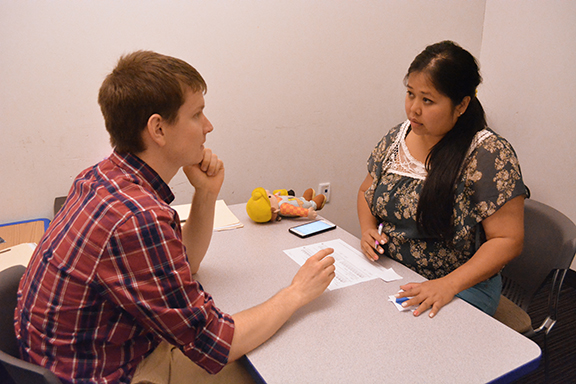
UHCL autism center expanding services with $550,000 in state grants
University of Houston-Clear Lake’s Center for Autism and Developmental Disabilities has been awarded more than $550,000 to expand services to local children with autism, their families and their teachers.
The Texas Higher Education Coordinating Board awarded CADD two grants through the Autism Grant Program, one to support parent-directed treatment and one for teacher and paraprofessional training.
Under parent-directed treatment, UHCL was awarded $330,600 to create the Connecting the Dots program, which will offer children with autism and their families integrated treatment through CADD’s Severe Behavior Disorders Research Clinic and the Verbal Behavior Clinic.
“What we hope to achieve is to synthesize these two approaches so parents have a better understanding of how treatment for reducing problem behavior and for improving social skills fits together in the child’s everyday life,” said Associate Professor of Behavior Analysis Jennifer Fritz, director of the Severe Behavior Disorders Research Clinic.
Associate Professor of Psychology Sarah Lechago, who directs CADD’s Verbal Behavior Clinic, said this approach will help caregivers consider their child’s treatment holistically, improving both the effectiveness and consistency of their work at home.
“What we hope for in the long run is improved implementation of treatments on the part of the caregiver which hopefully will lead to greater improvements in the children’s behavior: their problem behavior decreases, and they acquire effective communication and social skills,” Lechago said.
Unwanted behavior and delayed social skills can often interact with each other – children who have difficulty appropriately communicating what they need and want are more likely to exhibit unwanted behaviors.
“Once we treat problem behavior, they typically will have other social skill deficits in areas of language besides just asking for things that they want,” said Fritz. “We’re going to work with the parents to produce meaningful outcomes in both of those areas.”
As the program progresses, both directors are looking forward to new insights, and Lechago noted that the Connecting the Dots program further distinguishes CADD’s specialized clinics.
“This integration is a new approach,” she said. “We’re blazing a trail.”
With the grant, Connecting the Dots has hired two board-certified behavior analysts to manage the program. UHCL students will also assist under professional supervision, allowing them to deepen their studies and gain hands-on clinical experience.
The program is free for the families who participate, and they will be selected from CADD’s existing wait-list. Connecting the Dots will also offer a tailored lecture series for families participating in the program.
The second grant, for $229,598, will help CADD expand its existing Applied Behavior Analysis Academy for area teachers. While ABA Academy previously offered summer workshops, the new funding will support a yearlong project to educate 100 teachers and 200 paraprofessionals who work with students with autism spectrum disorders in several local school districts, ultimately benefiting hundreds of students.
ABA Academy gives teachers a thorough foundation in using applied behavior analysis in the classroom. Applied behavior analysis uses principals of learning theory to change behavior – in this case, focusing on strategies to help students with autism learn and interact in the classroom setting, decreasing unwanted behaviors and increasing desired behaviors.
In addition to two days of intensive training, teachers are also observed and coached by a board-certified behavior analyst as they return to the classroom and train colleagues in the skills they have learned.
“This program will provide training and support to teachers in their own classrooms, which we were not able to do over the summer,” said CADD Director and Professor of Psychology Dorothea Lerman. “Part of our mission is to train current and future professionals, and we are thankful that this funding will allow us to expand that effort.”
Clear Creek, Pasadena, Fort Bend, Lamar, Wharton, Boling and East Bernard Independent School Districts are expected to participate in the expanded ABA Academy this academic year.
CADD supports people with an autism spectrum disorder and developmental disabilities and their families through assessment services, couples counseling, the Verbal Behavior Clinic, the Severe Behavior Disorders Research Clinic, vocational services and focused intervention services with the Applied Behavior Analysis – Skills Intervention Program.
To learn more about CADD and ways you can contribute, email AutismCenter@uhcl.edu or call 281-283-3452.
